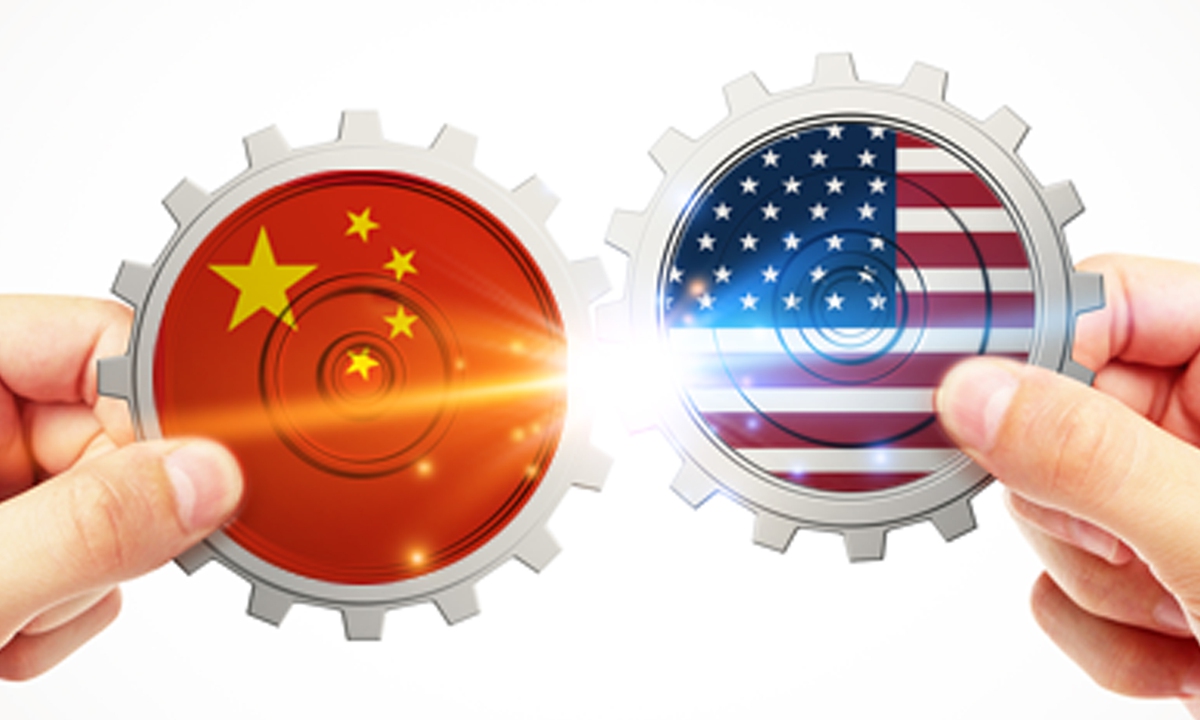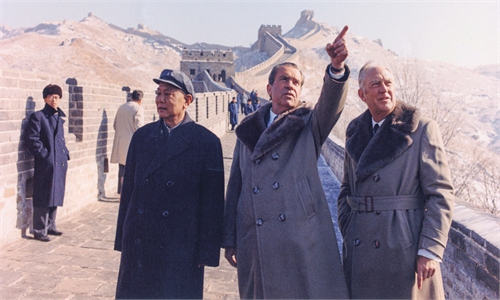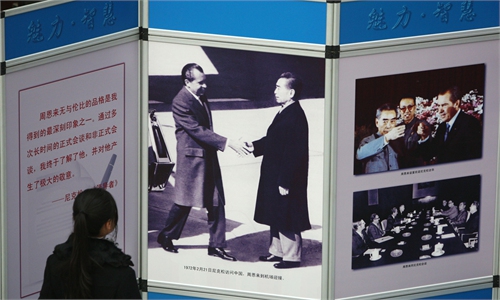OPINION / GLOBAL MINDS
Look to history to inform China-US relations today

China-US Photo: GT
For those of us disheartened by the sorry state of Sino-US relations, the 50-year anniversary of former US President Richard Nixon's surprise visit to China in 1972 offers an opportunity for reflection and perhaps a chance for hope. Can looking back 50 years inform Sino-US relations today?What can we learn from that historic breakthrough, coming as it did after more than 20 years of animosity, when China and the US were outright enemies, a protracted period that hit bottom during the Korean War (1950-53) when Chinese and American soldiers fought fierce, bloody battles, some of them hand-to-hand?
I am going to present some principles underlying and driving that long-ago diplomatic triumph that transformed Sino-US relations then, and suggest how they may offer fresh ideas for transforming Sino-US relations now.
But first, I am afraid we need to review how serious the problem really is. What do enlarging majorities in both countries, China and the US, really think about the other side? It is a picture that is not pretty. On both sides, we've witnessed a precipitous drop in sentiments, such that each side's opinion of the other hardens at a historic low. What should be a priority, like US-China cooperation in pandemic control, is perfunctory. What should be ignored, like conspiracy theories, is promoted. Sadly, the energy and intensity in both countries, driven by media and social media, escalates antagonisms.
I here lay out the sensitive issues. I do this to cool, not inflame, because overt discussion can erode the escalating enmity that ossifies when deep-seated emotions are bottled-up and kept private.
Chinese majorities believe the US is dedicated to "containing" China and stopping its rise. This is the real reason, they say, why America supports Taiwan - not as a paragon democracy, but as an "unsinkable aircraft carrier" which the US can use to threaten China while keeping the motherland divided. They see America building alliances to preserve its hegemony by surrounding China: with the Quad (US, Japan, India, Australia) and AUKUS (Australia, UK, US); also with South Korea, Philippines, even Vietnam. The US hacks into China's computers and sends endless spy planes to patrol its shores. The US foments "extremism, separatism and terrorism" in Xinjiang and Tibet; trespasses with naval force into China's sovereign territory (South China Sea); interferes with China's internal affairs by stirring up rebellion and violence in Hong Kong; maliciously blames China for the origin of the COVID-19 pandemic; spreads false rumors and smears China; applies the long arm of American law against China's interests anywhere in the world; and tries to inject Western values to overwhelm Chinese culture, eroding China's independence and undermining its sovereignty.
American majorities believe that China plays by its own rules, using a mercantilist economic system of government subsidies to gain unfair advantage, and modernizing a burgeoning military to enforce geopolitical ambitions, especially by building a blue-water navy. China critics claim that China has become more restrictive at home and more aggressive abroad, seeking territorial expansion and unleashing "wolf warrior" diplomats. They assert that there is little reciprocity in the China market and none in media access; that China steals technologies to boost its economy; and that China limits human rights. China is accused of vast cyber theft in industrial and commercial sectors as well as for defense. The palpable fear is that as China increasingly becomes more powerful, it will seek to further control information and discourse beyond its borders. China critics add charges of "ethnic genocide" in Xinjiang, abrogation of press freedom in Hong Kong, threats to Taiwan, supporting "rogue states" like North Korea and Iran, and backing Russia as it "threatens" Ukraine.
We have entered a period of intense and unrelenting "struggle" between China and the US, although I would hesitate to call it an "ideological struggle." For example, issues of sovereignty and territoriality, for all countries, are drivers of foreign policy irrespective of political ideology. Nationalism transcends ideology.
I am always astounded how intelligent folk can so easily see the misguided nationalism when viewing dispassionately the behaviors of others, while they are so easily blinded by not discerning the same misguided nationalism in their own, similar passions.
This brings us back to President Nixon's breakthrough trip to China and his historic meeting with Chairman Mao Zedong. Here's what we may discern and perhaps apply.
1) Long-term enemies can reconcile, even after protracted and devastating conflict. China and the US are far less antagonistic in 2022 than they were in 1972, though issues today are admittedly more complex. (Witness also France and Germany after World War II and the Abraham Accords between Israel and Arab states.)
2) It takes a very few people to make a very big difference - for China, Mao Zedong and Zhou Enlai; for the US, Richard Nixon and Henry Kissinger. Sometimes, hardliners have more flexibility to compromise, because they are less vulnerable to domestic criticism. Though public opinion may seem resistant or even antagonistic to reconciliation, leadership can transform attitudes.
3) Issues that seem irreconcilable need not derail agreement. "The Shanghai Communiqué", drafted and redrafted over seven months and issued at the end of Nixon's visit, was a master class in diplomacy; it addressed all the sensitive subjects, including Taiwan, with nuance and subtlety, and bridged what might have been unbridgeable chasms by using language to allow differences in interpretation.
4) Enemies who have enemies in common can suddenly normalize relations (if not become friends), operating under the perennial geopolitical banner of "the enemy of my enemy is my friend." In 1972, both the US and China had a conflict with the Soviet Union. Today, both are encountering conflict with the COVID-19 pandemic, global warming, macro-economic recovery, international terrorism, and the like.
5) Secrecy is essential for delicate negotiations. In his clandestine trips to China preparing for Nixon's trip, Kissinger did not use translators from the US State Department for fear of leaks. Secrecy is far more difficult today, with mobile phones ubiquitous and the internet always on, but it is still absolutely essential.
It is no state secret that there are multiple, tortuous issues between China and the US. But if I'd have to pick one from each side, the most insidious, it would be these: in the US, when some call for the CPC to be removed from power, direct interference in the internal affairs of a sovereign state; and in China, when some would seek to control information and influence discourse in other countries, via economic and other means, an approach that is often counterproductive.
The challenge for the US is to avoid threatening China's core interests, especially CPC leadership and Taiwan. The challenge for China is to reduce the anxiety of those who fear China's rise.
To help, I wish we could enlist Zhou Enlai and Henry Kissinger of 1972. I know they would have the vision and I'd bet they could devise a plan. If they could, couldn't we?
The author is an international corporate strategist, investment banker, and chairman of The Kuhn Foundation. He was awarded the China Reform Friendship Medal. opinion@globaltimes.com.cn



